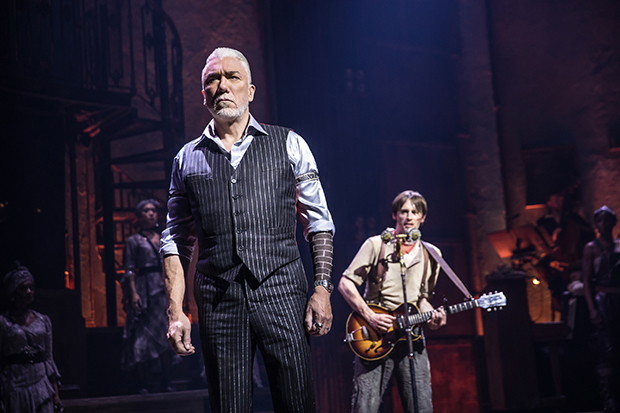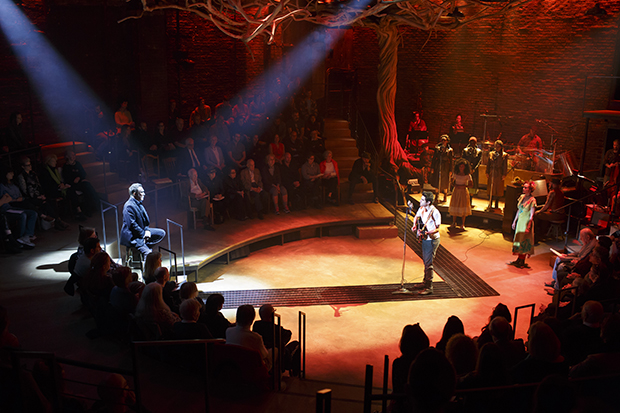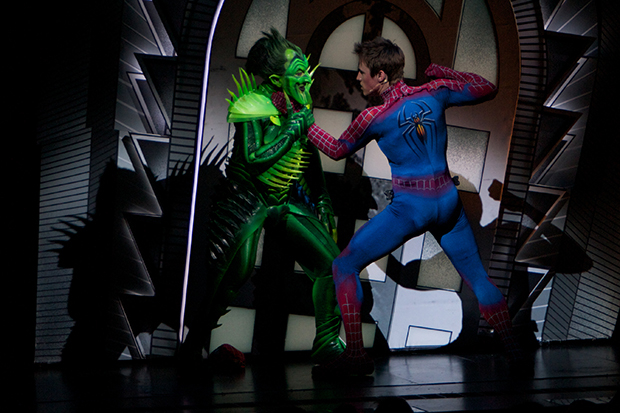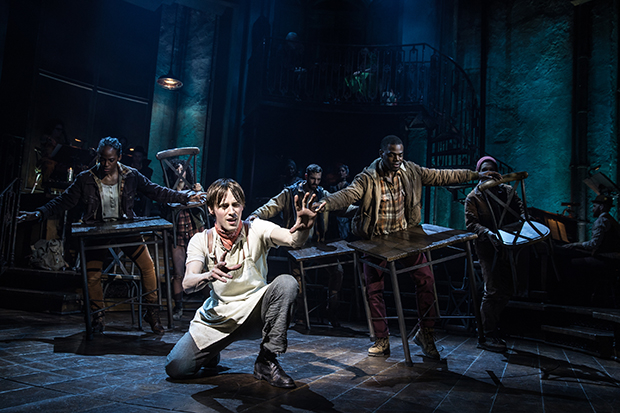After Flying High in Spider-Man, Reeve Carney and Patrick Page Go Way Down to Hadestown
From Spider-Man and the Green Goblin to Orpheus and Hades, Carney and Page play their second set of mythological foes on Broadway.
For the second time in a decade, Reeve Carney and Patrick Page are on Broadway together as mythological enemies. In 2010, they went head-to-head as the Marvel-world mythological characters Peter Parker and Norman Osborne (a.k.a. Spider-Man and the Green Goblin) in the beleaguered musical Spider-Man Turn Off the Dark. Now, they're playing rivals of a literary mythological sort, starring as Orpheus and Hades in Anaïs Mitchell's Hadestown at the Walter Kerr Theatre.
Both Carney and Page think it's a bit of a stretch to say that these two roles are similar to the ones they played in the past ("There may be little grains of Norman Osborne in terms of the megalomania in Hades," Page notes with a laugh). However, even though the production of Spider-Man went through the wringer during its extensive preview process and Hadestown has not, the respective journeys undertaken by the two actors as the shows came to life are, in fact, alike. Through both processes, they've learned to trust their collaborators, celebrate their friendships, and revel in the life-changing experiences they're providing to audiences.
This interview has been condensed and edited for clarity.

(© Matthew Murphy)
This show has gone through a lot of major changes over the course of its various runs. What have you learned about the piece and your characters from going on this journey with Hadestown?
Patrick Page: What I learned most was how much natural resistance I have to change and that if I'm just patient and allow it to happen, and trust [director] Rachel Chavkin and Anaïs Mitchell, they will figure it out. I was convinced that this show needed to exist in the environmental space, like it did at New York Theatre Workshop.
But as soon as we started doing it in Canada, it was, in many ways, stronger. The whole play boils down to a single, spoiler-alert moment, where the audience has to all be looking at the same place at the same time. You can direct them to do that in a proscenium space but couldn't at New York Theatre Workshop.
Reeve Carney: I had a lot of changes with my character between London and New York. They've made some modifications that I wouldn't have thought of, that drastically alter the way Orpheus interacts with every other character. I think he traded his bravado for a sense of guilelessness, and in a broad sense, that's the main factor that motivates every decision I make as Orpheus. That was very helpful. With this team, it feels like we're doing the show from scratch each time.
Patrick: We did do it from scratch each time. At New York Theatre Workshop, there was a big tree as part of the set. It was the idea of gathering beneath a tree to tell a story. We also had the tree in Edmonton. When I saw the set for London and the tree was gone, I was like, "Oh my gosh." Rachel has learned from each previous production, and then she's creating a new one. Even though we closed in London less than two months ago, it still feels new to me [on Broadway].

(© Joan Marcus)
Beyond the media frenzy, what was the Spider-Man Turn Off the Dark experience like with the benefit of nearly a decade's hindsight?
Patrick: It was one of the greatest experiences I've ever had. We toss around the word "family" a lot in the theater, but we really did become a family, and those friendships have lasted. Being part of something that was in everyone's awareness was wonderful, and then were the things that were difficult. But aside from people getting genuinely hurt, like Chris Tierney falling, and reputations and feelings being hurt, I wouldn't really trade the rest of the experience. It did more to bring people inside that building together than it fractured people apart, in my experience.
Reeve: It was a good training ground for someone making their Broadway debut. I didn't know what to expect. It took people like Patrick to be like, "This isn't normal, just so you know." It was so ambitious, technically speaking, that it was like being at NASA every day in there. After maybe 60 previews and being in tech for that long, I didn't know that part wasn't normal. When they explained to me that it was unusual, it was like, "OK, that's good, cause I feel pretty tired." [laughs]
Patrick: But there also was a lot that was normal. And I think sometimes it was hard for people who were having their first experience [to differentiate]. We had to say, "No, this part is normal, and it's difficult and it sucks, but that's every show," and then "this part is just this show." [laughs]

(© Jacob Cohl)
In a different way, Hadestown seems to be entering people's awareness, too. Especially younger people, judging by the makeup of the audience when I saw it.
Patrick: It's really connecting with young people. That's not to say that it doesn't also connect with older people. But younger people seem to be finding something more than an evening's entertainment. They've found a voice in Anaïs Mitchell, someone who's asking the questions they're asking and have similar values and curiosity and passion.

(© Matthew Murphy)








